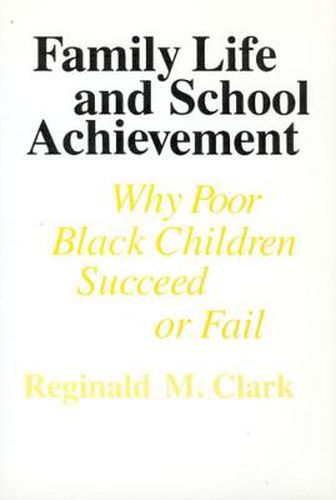Readings Newsletter
Become a Readings Member to make your shopping experience even easier.
Sign in or sign up for free!
You’re not far away from qualifying for FREE standard shipping within Australia
You’ve qualified for FREE standard shipping within Australia
The cart is loading…






Working mothers, broken homes, poverty, racial or ethnic background, poorly educated parents–these are the usual reasons given for the academic problems of poor urban children. Reginald M. Clark contends, however, that such structural characteristics of families neither predict nor explain the wide variation in academic achievement among children. He emphasizes instead the total family life, stating that the most important indicators of academic potential are embedded in family culture.
To support his contentions, Clark offers ten intimate portraits of Black families in Chicago. Visiting the homes of poor one- and two-parent families of high and low achievers, Clark made detailed observations on the quality of home life, noting how family habits and interactions affect school success and what characteristics of family life provide children with school survival skills, a complex of behaviors, attitudes, and knowledge that are the essential elements in academic success.
Clark’s conclusions lead to exciting implications for educational policy. If school achievement is not dependent on family structure or income, parents can learn to inculcate school survival skills in their children. Clark offers specific suggestions and strategies for use by teachers, parents, school administrators, and social service policy makers, but his work will also find an audience in urban anthropology, family studies, and Black studies.
$9.00 standard shipping within Australia
FREE standard shipping within Australia for orders over $100.00
Express & International shipping calculated at checkout
Stock availability can be subject to change without notice. We recommend calling the shop or contacting our online team to check availability of low stock items. Please see our Shopping Online page for more details.
Working mothers, broken homes, poverty, racial or ethnic background, poorly educated parents–these are the usual reasons given for the academic problems of poor urban children. Reginald M. Clark contends, however, that such structural characteristics of families neither predict nor explain the wide variation in academic achievement among children. He emphasizes instead the total family life, stating that the most important indicators of academic potential are embedded in family culture.
To support his contentions, Clark offers ten intimate portraits of Black families in Chicago. Visiting the homes of poor one- and two-parent families of high and low achievers, Clark made detailed observations on the quality of home life, noting how family habits and interactions affect school success and what characteristics of family life provide children with school survival skills, a complex of behaviors, attitudes, and knowledge that are the essential elements in academic success.
Clark’s conclusions lead to exciting implications for educational policy. If school achievement is not dependent on family structure or income, parents can learn to inculcate school survival skills in their children. Clark offers specific suggestions and strategies for use by teachers, parents, school administrators, and social service policy makers, but his work will also find an audience in urban anthropology, family studies, and Black studies.